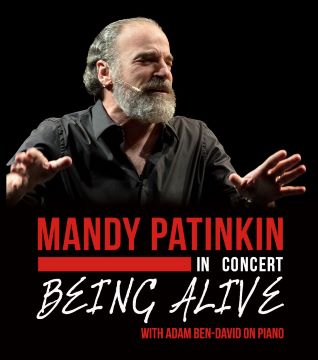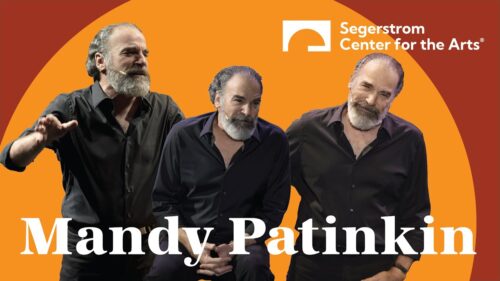FINE AND MANDY!
Mandy Patinkin, a venerable artist of 71years, known for his remarkable presence on the stage, in television, and on the silver screen, graced the esteemed Renée and Henry Segerstrom Concert Hall in Costa Mesa with his latest production, Being Alive. The title, a nod to the Stephen Sondheim song from the legendary musical Company, underscores Patinkin’s deep connection to the world of musical theater.
Patinkin’s illustrious career was launched with a Tony Award-winning portrayal of Che in Evita, and he has maintained a consistent presence on Broadway, television, and in film. He has etched his mark in the theater world with his original portrayal of Georges Seurat in the Pulitzer Prize-winning Sunday in the Park with George, left an indelible impression as the iconic Inigo Montoya in movie The Princess Bride, and didn’t sing but bared his tuchis in the movie Yentl.
Patinkin has recorded several albums. He is a song stylist rather than a conventional singer. His vocal delivery possesses imperfections; a pronounced break resides squarely in the middle of his range. He delivers low notes with robust baritone chest tones, high notes with a falsetto, but tends to croak out his middle notes. As the years have passed, his entire vocal range has turned into a wobbly vibrato. Yet, despite these limitations, Patinkin masterfully employs his voice as a vehicle for storytelling. He seamlessly transitions from a resonant, 1970s ballad tone for exposition to an articulated staccato or even a fervent yell in the blink of an eye, conveying admiration, bewilderment, and fury with equal finesse.
In this performance, Patinkin departed from his often-ridiculed manic style in favor of a poignant, ballad-heavy performance, intertwined with personal anecdotes about fading memories, his own upbringing, fatherhood, and his Jewish-American identity. While he spoke of his joy in having had a happy childhood, a long and fulfilling marriage, and the successful upbringing of his now-adult children, Patinkin’s overarching fear of his own mortality remained the driving force of this concert, as he took stock of both his personal life and his remarkable fifty-plus-year career in show business.
Dressed in somber black attire, Patinkin took to a darkened stage, which was illuminated sparingly but effectively by Nathan W. Scheuer’s simple stage lighting or, on occasion, by only a ghost light. This approach effectively directed the audience’s focus toward Patinkin and his exceptional pianist and musical director, Adam Ben-David, whose wonderful playing enhanced the sharp comedic moments provided by Patinkin, seamlessly supplemented by Daniel J. Gerhard‘s sound design. Sparingly utilized props included an oversized newspaper, a megaphone, and a ukulele.
This concert took on added significance in the context of the Israel-Gaza war and the global surge in antisemitism. Many of the evening’s performances and anecdotes had a connection to Judaism, whether through the artist’s faith, the subject matter of the scores, or linguistic reinterpretation. The iconic song “Somewhere Over the Rainbow” was sung partially in Yiddish, as Patinkin erroneously asserted that Harold Arlen and Yip Harburg wrote the song about their parents’ odyssey, fleeing the harrowing pogroms of Russia to seek solace in the United States. Although it remains an indubitable fact that the parents of these esteemed composers did indeed embark upon such a tumultuous journey, it is imperative to acknowledge that the veracious genesis of this lyrical opus, as elucidated by Harold Arlen himself, grew organically out of the story of the movie’s narrative.
Other selections by Jewish lyricists and composers included “Soliloquy” from Rodgers and Hammerstein’s Carousel, several songs by Randy Newman (including “Wandering Boy”), and, of course, Sondheim’s “Being Alive” and “Children Will Listen.”
Name dropping anecdotes included the story of how Patinkin was introduced to Stephen Sondheim by Angela Lansbury at Harold Prince’s opening night party for Evita. He told Sondheim “You’re the Guy on the Scrabble Album!” (the 1973 Sondheim Evening: A Musical Tribute) and then asked Sondheim to sing and play “Anyone Can Whistle.” Patinkin’s melancholic rendition of the song was a highlight of the evening.
Patinkin’s eclectic repertoire further featured songs like “Inch Worm,” “Time in a Bottle,” “A Tisket A Tasket,” “Rock Island” from The Music Man, Lyle Lovett’s “If I Had a Boat,” and Freddie Mercury’s “Bohemian Rhapsody.” The latter was transformed by Patinkin into an operatic aria, alternating between the singer’s frustration with his life and a somber acceptance of his fate.
Despite his vocal limitations, Patinkin used his voice and physical mannerisms to tell stories via song and anecdote, keeping the audience spell bound for 95 minutes. This performance presented a rare opportunity to witness an iconic artist at the zenith of his interpretive powers, even in the face of the vocal limitations brought on by the passage of time.
Mandy Patinkin in Concert: Being Alive
reviewed November 2, 2023 at Renée and Henry Segerstrom Concert Hall
tour continues; for dates and cities, visit Mandy Patinkin



{ 7 comments… read them below or add one }
Saw the beautiful show in Mesa, Arizona. What is the name of the song about the mother who can’t remember her son?
The song is “My Mom” by Chocolate Genius (1998).
This song lyrically navigates through the poignant journey of a narrator revisiting his childhood memories, set against the backdrop of his mother’s progressing memory loss.
I love Mandy Patinkin. We saw his show at Kravis and thought his song selection was terrible, the tone of the night depressing, and his voice — while serviceable still — is weakening. Part of our group left in the middle. So disappointing for such a beloved dramatic theatrical performer.
Mandy, what were you thinking when you planned this?? Switch your song selection to something more uplifting, cheerful. I’m getting old as well, but mortality thoughts should be filtered out of your show.
Again, saddened, disappointed, depressing and bizarre.
Saw the show last night in West Palm Beach and it was both moving and magical! We are lifelong fans, attending his Broadway and NYC Performances 13-15 times for each of his shows (Evita, Sunday in the Park with George, Joseph Pap performances). His voice is strong and powerful! Adam Ben-David’s performance was beyond amazing! An evening we will never forget and will cherish. If you have the opportunity to attend-absolutely don’t miss it.
You, my dear sir, are obviously in the minority. The songs were funny at times, emotional and reflective at other. The show is a master class in interpretive musical theater. Outside of a selection from The Secret Garden, the show was perfect as is.
If you left halfway through the show, it’s entirely your loss. I’m from a younger generation, so not all of the songs were known to me. But he ends with a very special number, sung partially in Hebrew. (I won’t name it here, spoilers!). Mandy Patinkin is an absolute legend and seeing him perform was nothing short of special
Coming in and demanding things of a performer, just because you expect a certain tone, is not it. And it’s clear the unsatisfied reviewer chose to hone in on their disappointment and shout out their demands. Clearly, they didn’t pay attention during “A Tisket a Tasket†which was very funny, along with other numbers. The show had its ups and downs; both laughter inducing and sobering moments.
I would have LOVED to see him perform something from Sunday in the Park With George, (yes, Finishing the Hat in particular,) but it didn’t happen. Still loved Anyone Can Whistle, It’s Not Easy Being Green, School Days, You’ve Got to Carefully Taught/Children Will Listen (with a very special verse not sung in “Into the Woodsâ€,) and all the others. His sense of humor was great and his interpretation and physical humor are spot on.
Imagine going to see a legend perform which is probably a once in a lifetime opportunity and then chosing to complain and leave. That is the real disappointment, in my opinion. You will miss out, if you don’t stay. This Millenial is grateful for all of it.
We just saw the show this afternoon at the Ordway in St. Paul. It was a very interactive show – Mandy got a little sassy in a humorous way with a few audience members, who I’m sure will remember that the rest of their lives. The song selections and arrangements were a delight, some wistful, some funny, some sad and some pointedly pertinent to what is going on in today’s world. Mandy has never had a beautiful voice – he has always been more of a smart interpreter, a singing actor whose performance led his voice rather than the other way round. This is probably more pronounced as he gets older, as is the strength of his performance skills. No one cared if the melody was not exact or pretty – there were moments of silence, of active listening by the audience where we were waiting to see what came next that I have never heard for another performer. It made me think of another Broadway great that I saw late in her career, performing mostly Sondheim, Barbara Cook. She did have a beautiful voice, even as she aged, and the Sondheim interpretations were stellar, as was the ending, a nod to what is expected of Broadway performers no matter their stage in life. She did a brilliant lip-synch version of “Glitter and Be Gay” from Candide, her show stopper from when she was a young woman with an unparallelled range. She knew what the audience expected and wanted and found a way to provide it with a nod to the changes age brings so we could all acknowledge it and laugh a little. Mandy did the same with his whole show – he knew when to stop singing for a bit and share anecdotes that brought us full circle, into a little period where we all wished we’d brought more Kleenex, then some humor, and an encore that sealed the deal by being a poignant version of a song everyone knows and loves.